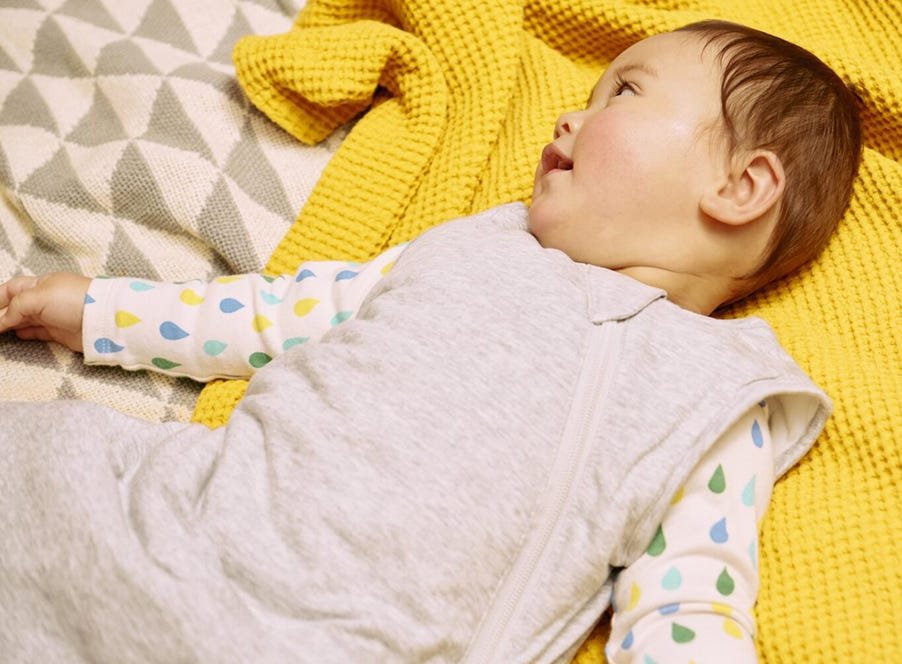
Ultimate XL Nappy Disposal Bundle with 18 Refills
Bundle & Save 40%
Subscription orders can be cancelled at anytime. Free delivery on all subsequent subscription orders. Find out more about subscriptions.
They’re easy and fuss free
Your products are automatically sent to you
You save up to 10% when you sign up for a subscription
You can cancel at any time

As new parents, one of the most exciting milestones we look forward to is our baby's first smile. That precious moment when their little face lights up with joy and they show us that they are happy to see us is simply heart-melting.
But when exactly can we expect our baby to smile for the first time? Is it just a reflex or a genuine expression of emotion? In this blog post, we'll explore what's behind baby smiles and answer all your questions about when babies smile.
Learning to smile is an important milestone in the timeline of a baby's visual and social development. And their little tot's first smile is an emotional memory that's treasured by a parent forever.
Some may argue that there’s nothing cuter than a tiny toothless grin! So, let’s run through when most babies first show signs of what’s known as ‘reflex’ smiling, and when you can expect to see their first proper ‘social’ smile.
From about two months (six weeks) a baby can smile on purpose, however, it can take a little longer depending on the baby.
From around the age of three or four months, most babies begin to smile when they:
By six months babies usually master their signature smile and will start laughing – adorable!
As with all aspects of a baby’s development, there’s no exact timeline that a baby should follow when learning to smile. All little ones are different, but here’s a rough guide to when they usually start to smile.
At first, a newborn baby’s eyesight isn’t fully developed. The world around them may look a little fuzzy, and they’re not able to focus beyond six to 10 inches. At this stage, they will struggle to maintain eye contact and focus on your face.
As they grow, your baby's eyesight will begin to improve, and they'll be able to focus on and follow your face. They'll start to notice your facial expressions and be able to recognise when you smile, stick your tongue out, or raise your eyebrows. While some babies react with a smile at two months, others may take a little longer, and that’s totally normal!
By around eight weeks old, most little ones will debut their first smile. This is a real moment to cherish, so get your camera ready! By three months old, they'll start to become a lot more socially engaged with you. When you smile and chat with them, they'll be able to mirror your response by grinning and gurgling.
At around three to four months old, most babies can hold your gaze and recognise the faces of their favourite people. It’s around this time that you might notice that your baby needs to take time to get used to new faces.
By the time they hit the six-month milestone, most little ones can babble, giggle, and give big cheesy grins. Games of peek-a-boo will delight them, and their little personality will start to shine as they become more curious and adventurous every day.
Social smiles are real smiles that are triggered in response to something that a baby sees or hears that makes them feel happy or loved, like your voice or eye contact. They usually happen when a baby is alert and wide awake and are not caused by gas or a reflex while they’re sleeping.
Social smiles require a baby to use their whole face, not just their mouth – think raised eyebrows and wide-open eyes!
These first social smiles are a key development milestone on the road to learning to talk. They show that your baby is starting to learn how to communicate feelings of playfulness and joy, and can be used as a good way to understand how your baby is feeling.
You'll likely see your little one's first real social smile from around two or three months of age. Other adorable signs that your baby is happy and content include:
Babies who smile from birth and developing babies who appear to smile in the womb during second-trimester ultrasound scans are displaying something known as neonatal reflex smiling.
These smiles often happen between birth and one month of age when a baby is passing wind, falling asleep or feeling comfortable. Although they’re adorable, they’re not caused by what a baby has seen or heard.
You can think of reflex smiles as your baby getting to know how their mouth moves and their facial muscles work. Even though they're spontaneous and shorter than the real deal, that doesn't mean they're not super cute!
Babies develop at their own pace, so there's no set age at which a newborn will start smiling. However, most babies will start smiling socially at around six to eight weeks old.
As a parent, it's natural to worry about your baby's development, but some babies may take longer to smile or show other signs of social interaction. It's important to remember that each baby develops at their own pace, and not hitting a milestone at a specific time doesn't necessarily mean there's cause for concern.
If they're vocal, able to make and maintain eye contact and respond to verbal and visual cues from you, it's probably nothing to worry about. They may just not be a smiley person at this early stage in their life. That said, not smiling can sometimes be a sign of a developmental delay or issue, so if you're worried about your baby's development, it's always a good idea to speak with your doctor. They can provide guidance and reassurance, and help you determine if any further evaluation or intervention is needed.
Yes, it's generally considered a good sign if a baby smiles, especially socially around 6-8 weeks old. However, it's important to remember that babies develop at their own pace and there is no set age for when they will start smiling.
Yes, babies are usually able to see the person they are smiling at, especially from around six to eight weeks old. However, it's important to remember that every baby develops at their own pace and there's no set age for when they will start recognising faces.
If your baby isn't smiling yet, it's okay. Every baby develops at their own pace, and not hitting a milestone at a specific time doesn't necessarily mean there's cause for concern.
If your little one was born prematurely, it may take a little longer to learn how to smile than a full-term baby would. But if you're worried about your baby's development, it's always a good idea to speak with your doctor for guidance and reassurance.